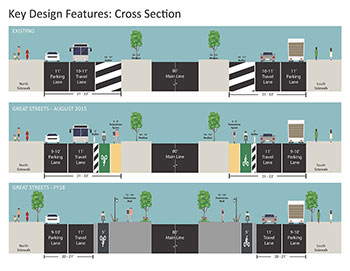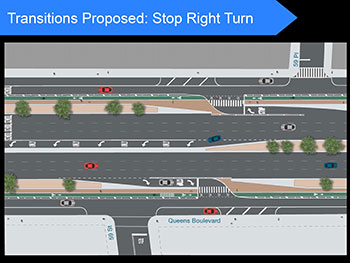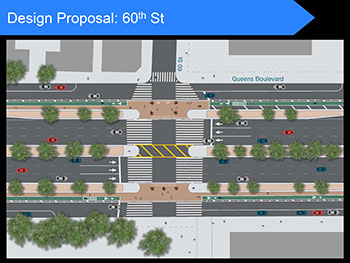Press Releases
FOR IMMEDIATE RELEASE
Press Release #15-047
March 31, 2015
Scott Gastel/Bonny Tsang (212) 839-4850
DOT to Unveil Concept This Evening to Dramatically Redesign Queens Boulevard Corridor, Starting Along 1.3 Miles
Plan is being developed based on community input from a hands-on community workshop in January and will be discussed at this evening’s Community Board 2 meeting;
Implementation of the first segment, between Roosevelt Avenue and 73rd Street, is anticipated to be completed in August 2015
Safer crossings, protected bicycle lanes, increased pedestrian space, and improved intersections are all incorporated into the plan
Project lays the groundwork for a $100 million capital investment on Queens Boulevard, a Vision Zero Priority Corridor, as part of the de Blasio Administration’s Great Streets initiative
New York City Department of Transportation (NYC DOT) Commissioner Polly Trottenberg today announced that DOT will present to the Queens Community Board 2 Transportation Committee this evening a detailed preliminary plan to redesign a 1.3 mile segment of Queens Boulevard, including the installation of a protected bike lane. Queens Boulevard is one of the most chronically dangerous corridors in New York City, with 38 traffic fatalities and 448 severe injuries from 2003-2013.
This project will launch the beginning of the $100 million Great Streets initiative covering the entire 7 mile corridor. The operational project, which is being developed with local stakeholders and being reviewed by the community board, is expected to be implemented in August 2015. DOT anticipates holding public workshops this fall and winter for additional phases of the boulevard project, from 73rd Street to Eliot Avenue and from Eliot Avenue to Union Turnpike.
“I want to thank Mayor Bill de Blasio for his relentless push to achieve Vision Zero in NYC and take on streets as challenging as Queens Boulevard,” said DOT Commissioner Polly Trottenberg. “After decades of crashes, many of them fatal, this corridor has been re-imagined and will be redesigned to become a safer, greener, and more attractive corridor for residents and businesses, suitable to traverse through the World’s Borough.”
“I applaud Mayor Bill de Blasio and Commissioner Polly Trottenberg for their tireless efforts to make Queens Boulevard safer,” said New York City Council Majority Leader Jimmy Van Bramer. “This work represents a major advancement in the efforts to achieve Vision Zero throughout our City. Thanks to the work of the DOT, we are seeing significant improvements in traffic safety in Western Queens, and we look forward to seeing Queens Boulevard safety improvements thanks to this $100 million capital investment.”
“For years, Queens residents have asked for safety improvements on Queens Boulevard, and now Mayor de Blasio has listened and delivered,” said Transportation Alternatives Executive Director Paul Steely White. “His vision for Queens Boulevard, and the pace of this planned safety redesign, will set the tone for the transformation of dangerous streets across the five boroughs. If we take the same approach to the rest of New York City’s most dangerous major streets, we can save 50 lives a year and prevent thousands of injuries.”
Queens Boulevard has drawn the attention of elected officials, residents, and advocates for years based on its crash and fatality history. The western segment of the corridor had six fatalities from 2009-2013, including two pedestrian deaths, which was the highest concentration of overall fatalities along the boulevard. This stretch also saw a significant amount of severe injuries during that time period.
DOT held a comprehensive public workshop on the corridor’s safety needs in January 2015 and developed the project proposal based on the information gathered and study of traffic and safety conditions. Among the top issues identified were residents’ concerns about speeding, an uncomfortable cycling environment, conflicts at intersections between pedestrians, cyclists, and vehicles, and unpleasant and dangerous-feeling pedestrian conditions.
Over the years, DOT has received numerous community requests for bike lanes on the corridor, including during DOT’s community-based bicycle network development process for the area. DOT began studying the possibility of expanding the cycling network east from Sunnyside at the request of members of Community Board 2. The effort gained greater urgency due to Mayor Bill de Blasio’s Vision Zero initiative and the continued problematic crash experience of Queens Boulevard.
Based on the community concerns and suggestions, the preliminary plan being shown tonight has a goal of truly calming the service roads of the corridor with a more consistent moving lane in each direction that is focused on local access. The plan seeks to focus through traffic on the main line roadway and reduce the incidence of motorists switching repeatedly between the main line and service road, a situation called “road shopping.” The concept plan also emphasizes eliminating the highway-like design features and completing the pedestrian network by connecting neighborhoods. An extensive analysis of crash history complemented the community input in shaping the concept plan.
This 1.3 mile segment has unique challenges created by overpasses that interrupt the roadway, numerous skewed intersections, and high volume entrances and exits to the Brooklyn-Queens Expressway. The concept plan addresses these challenges with complete street improvements and provides design solutions that once proven, can be extended to further segments of the corridor. Unique features include a protected bike lane incorporated into a widened service road median, with new pedestrian space and median to median crossings that allow for a linear park-like experience, similar to Eastern and Ocean Parkways in Brooklyn. Instead of proceeding via high speed slip lanes, vehicles transitioning between the main roadway and the service road will use “STOP” controlled right-turn lanes, which will slow speeds and allow for safe bicycle and pedestrian crossings.



—30—
